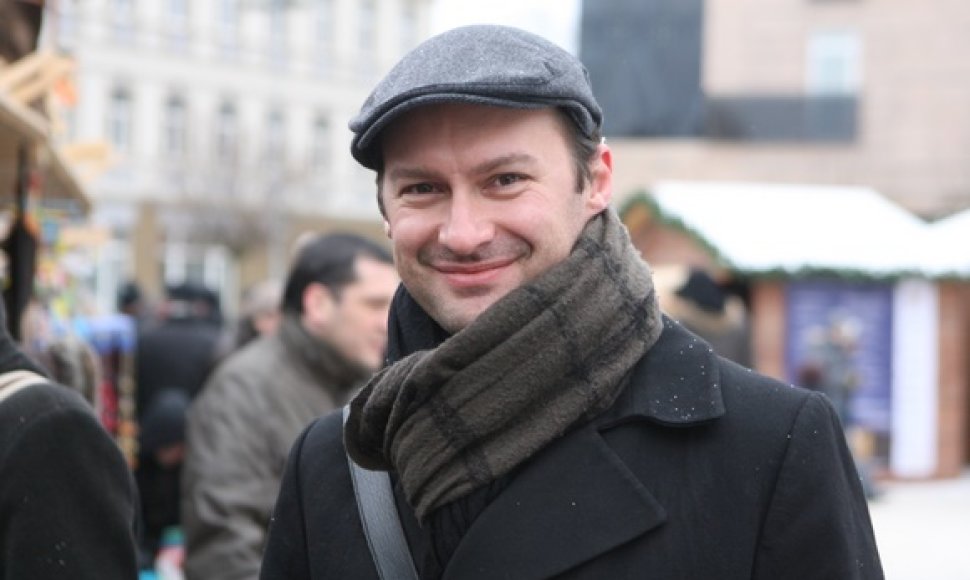He has already sang the part of Nemorino, once in the Lithuanian National Opera and Ballet Theatre production of “L'elisir d'amore” three years go and also on the stage of English National Opera. His début in 2010 was a huge hit among London opera fans, despite the fact that Montvidas sang in Italian in an otherwise English-language production.
Critics praise Montvidas' soft, sonorous tenor voice and note that his acting flexibility and good taste turn his roles into unforgettable experiences.
- Your performance on the stage of the Lithuanian National Opera and Ballet Theatre on Saturday is the only chance for Lithuanian fans to see you this year. You won't return before next February. Tough schedule.
 |
| D.Matvejevo nuotr./Edgaras Montvidas |
- It is part of the job. Lately, I have had to travel a lot outside Europe: I'm taking the first steps in the US market, I've got a tour in Japan scheduled for December. Some think my life is absurd, others say it's romantic. But I'm used to it. I've learned to pack a suitcase in 15 minutes, to make do with few things – it's always a good idea to leave some space for gifts! (winks)
- October in Boston, November in Brussels, December in Tokyo, Christmas Eve in Florence. Different time and even climate zones. Are you resistant to temperature changes?
- Sure, flouncing about the world is unbalancing, it disturbs the usual rhythm which is as important to an opera singer as to an athlete – both work with their bodies and muscles. But all depends one one's attitude and psychological disposition. If you keep pitying yourself, thinking how exhausted you are, you will be. I tend to think positively and, besides, I draw energy from adrenalin rush. For instance, I am only just entering the United States, I will have an audition in Chicago. Your are given 10-15 minutes to prove what you can. Cutthroat competition, you cannot take any break, unless you are world-famous star and your name alone speaks for your talents.
- Performing on a Lithuanian stage is probably pleasant but not very profitable.
- It goes without saying – the scale is completely different. But I understand the market, what ticket prices are, and the economic situation of the country. And still, I go by the principle that each work must be compensated for – if only nominally. It's not greed, just respect for one's profession.
- As of 2007, you're a freelance singer. What do you think about the practice still prevailing in Lithuanian theatres of keeping staff singers?
- That is something long gone in the West. Theatres invite outside performers, directors, art directors, etc. Theatres only have their own orchestras, choirs, ballet companies, and administration which, as a matter of fact, changes every few years. Chief artistic directors serve in terms at the end of which they are either re-elected or replaced. Rotation of leadership ensures dynamic repertoire. In Lithuania, on the other hand, you head the orchestra until they carry you off the stage.
 |
| Irmanto Gelūno/15min.lt nuotr./Generalinė operos fantazijos „XYZ“ repeticija |
In fact, there are changes here as well, the National Opera Theatre has invited a number of directors: Arnaud Bernard for Carmen, Anthony Minghella for Madame Butterfly, etc. Art director of the ballet company is the well-known Krzysztof Pastor.
Finally, the “Bohemian” company is also a relatively new phenomenon in Lithuania's art scene, a new search for artistic expression.
Staff system allows for easy submission to routine – a veritable death to an artist. Working in the West, you must keep challenging yourself. It is very difficult to remain competitive in the market which is joined by young, great, fantastic tenors every day. One must work ceaselessly in order to make your name known.
- Your tutor Virgilijus Noreika is giving a farewell tour now. The curtain falls for the last time one day – do you think of that?
- Maestro Noreika was and still is a role model for me. I often consult him while preparing a difficult part.
I do occasionally reflect on the end of my career, whether I want it or not, particularly since our profession is very fragile. In my youth, I'd dive into work with zest, recklessly, sacrificing everything else for singing. But time made me realize that it is silly and dangerous to lock yourself in the opera world.
One must keep some balance to experience all colours and tastes of life. To be honest, not even now can I afford the luxury of light-heartedly turning down roles. One must descend from the pink cloudlet of the opera world onto earth to realize that one will not be singing forever. What will happen to you, if, at the peak of your career, you give yourself entirely to work, ignoring friends, family, hobbies? A day will come when you look back and wonder: where's your personal life, who's in your entourage, finally, who are you without singing?
- One might follow the examples of opera singers Vladimiras Prudnikovas and Vytautas Juozapaitis – go into politics. One can never be bored there...
- Never say never. All I can say is that I am not apolitical. I live in London but I follow the news in Lithuania. I perform my civil duty and vote – I've already signed up with the embassy in London so I can cast my vote in October's parliamentary elections. I do not trust Royal Mail any more – I had my ballot returned once, so this time I am putting it in a box myself. It is important to me. I hope I'm voting for professionals and not for populists or groups that emerged spontaneously, out of sheer emotion.
I do not see myself as a parliament member today, since it is not my calling. But in ten years or so, I might feel differently, I might think I can be useful. After all, I didn't want to become a singer, I always dreamed of acting.
- Even though opera is mostly about singing, but your dream did come true to some extent. What are your favourite parts?
- There are some that I call bread and butter and caviare. Among them is the one that I do in Mozart's “The Abduction from the Seraglio.” It is one of the most complex and taxing parts for a tenor, requiring stamina and great voice technique.
Nemorino in “L'elisir d'amore” is particularly close to me, it fits my voice perfectly, showcases all I can. I also love Werther, Lensky – these are lyric parts.
There are roles I've never had but I dream of, like Cavaradossi from Giacomo Puccini's “Tosca,” Giuseppe Verdi's Don Carlos.
- Opera as a theatre genre changes, too. They say that a performer can no longer get away with just learning the lines and singing well.
- I think of myself as a creator as well as singer – I create through my interpretations. Unfortunately, my trade has a fare share of mechanics – and one can see that on stage. They are people without perspective. There are opera soloists who mostly care for long breaks between rehearsals so they can go and buy a Prada bag. They do not even bother to translate their lines in order to understand what they are singing. It is the attitude of a mechanic.
Artists must take interest in everything – literature, painting, design, history, even the manner of holding a tea cup among 18-century aristocrats. Artistic intuition and inspiration are not enough – one needs knowledge. After all, when you sing in Spanish, you must convey a certain cultural palette.
- Do you have any plans for a CD?
- Of course, it is an aspiration. Every artist wants to leave something after himself, especially as our art is of the here and now – you sing and a moment later it's gone.
Edgaras Montvidas
Born on 27 May 1975 in Kybartai, Vilkaviškis District.
Montvydas made his début on the National Opera and Ballet Theatre stage in 1999, as Lord Arturo in Donizetti's “Lucia di Lammermoor.” He was still a student of Noreika at the Lithuanian Music and Drama Academy.
His international career caught momentum between 2001 and 2003, when Montvidas interned at the Royal Opera in London. He successfully stepped in as Alfredo in Verdi's “Traviata” after the lead singer fell ill. In Covent Garden, Montvidas also performed in Laertes Thomas' “Hamlet,” played Fenton in Verdi's “Falstaff.”
Between 2004 and 2006, Montvidas worked as a soloist in Frankfurt am Main opera. He became a freelancer in 2007.
In 2009, Montvidas was awarded the Golden Stage Cross for his role as Werther. He has been living in London since 2001.













